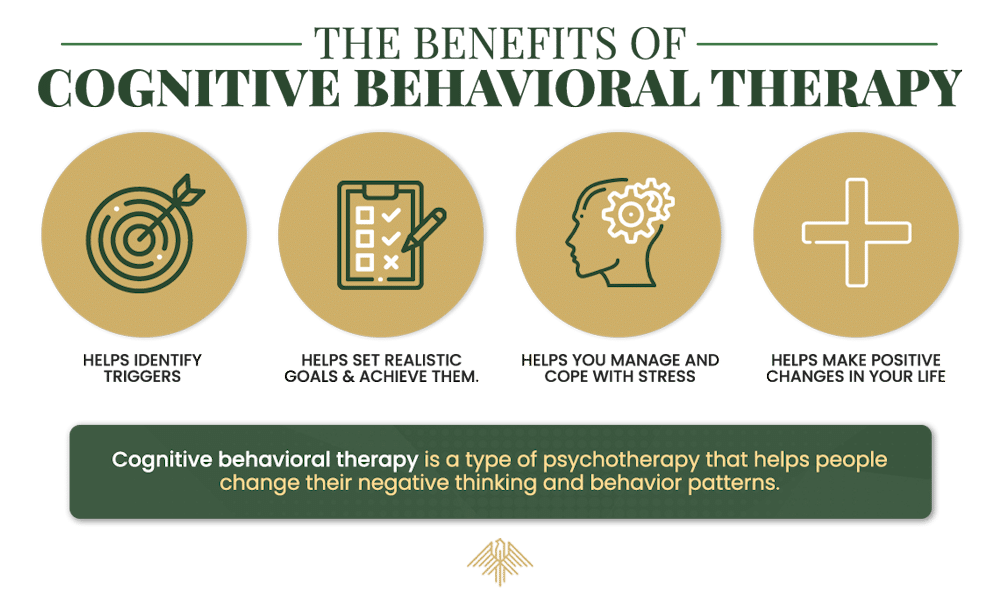Cognitive behavioral therapy (CBT) is a powerful tool in the fight against addiction, forming the backbone of many successful recovery programs. Studies show that individuals who engage in CBT for substance use disorders are significantly more likely to maintain long-term sobriety, with one report indicating as much as a 60% improvement in addiction treatment outcomes compared to those who did not receive CBT.
At Eagle Creek Ranch Recovery in Nampa, Idaho, CBT plays a vital role in the healing process. This evidence-based approach empowers individuals to identify harmful thought patterns, develop healthier coping strategies, and build a future free from addiction.
How Does Cognitive Behavioral Therapy Work?
Cognitive behavioral therapy (also known as CBT) is a type of psychotherapy that is designed to help people change their negative thinking and behavior patterns. This type of therapy is based on the idea that thoughts, feelings, and behaviors are all interconnected, a concept known as the cognitive triangle. By changing our thoughts, we can change our feelings and behaviors.
Cognitive behavioral therapy typically involves working with a therapist to identify negative thinking patterns and then learning how to replace them with more positive thoughts. This process can take some time, but it can be very effective in helping people to manage anxiety, depression, and other mental health conditions.
Why Wait? Find The Help You Need By Reaching Out To Us Today! Our Admissions Team Is Standing By.
What Kinds of Cognitive Behavioral Therapy Exist?
Besides the straightforward version of CBT that focuses on the cognitive triangle, Cognitive behavioral therapy (CBT) also encompasses a variety of approaches tailored to address specific needs and challenges. Some common types include:
- Dialectical Behavior Therapy (DBT): Originally created for individuals with borderline personality disorder, DBT emphasizes emotional regulation, mindfulness, and interpersonal effectiveness.
- Acceptance and Commitment Therapy (ACT): Encourages individuals to accept their thoughts and feelings instead of fighting them, while committing to actions aligned with their values.
- Exposure Therapy: Commonly used to treat anxiety disorders and PTSD, this approach helps individuals confront and gradually diminish fears through controlled exposure.
- Mindfulness-Based Cognitive Therapy (MBCT): Blends mindfulness techniques with cognitive principles to help prevent depression relapse.
Each of these modalities can be tailored to meet the unique needs of individuals during addiction treatment, offering versatile tools for lasting transformation.
How Does Cognitive Behavioral Therapy Differ From Other Therapies?
While cognitive behavioral therapy (CBT) is one of the most evidence-based and widely utilized therapeutic approaches for substance use and mental health, it differs in various ways from other modalities.
Unlike psychodynamic therapy, which explores unconscious processes and the influence of past experiences, CBT focuses primarily on current thoughts and behaviors. It is goal-oriented and often shorter in duration, making it more structured and time-efficient.
Compared to humanistic therapies like Person-Centered Therapy, which emphasize personal growth and self-actualization, CBT takes a more problem-solving approach to address specific mental health issues directly. In regards to subject matter, CBT contrasts with therapies like Exposure Therapy or Mindfulness-Based Cognitive Therapy (MBCT), which target specialized concerns such as phobias or trauma relapse.
Despite these differences, many individuals and treatment facilities find value in integrating elements from multiple approaches to create a tailored and comprehensive substance abuse treatment plan.

What are the Benefits of CBT for Addiction Treatment?
CBT has been proven to be an effective treatment for a variety of behavioral health and mental health disorders, including clinical depression, anxiety disorders, and post-traumatic stress disorder (PTSD) as well as substance use.
Benefits of undergoing CBT for addiction include:
- Practicing tools to manage substance use cravings and prevent relapse.
- Learning coping skills such as challenging distorted thinking and problem-solving, helping individuals address harmful thought patterns.
- The format encourages the development of positive habits that support long-term addiction recovery.
- A structured framework for progress, boosting motivation and accountability throughout the recovery process.
- Format adapts effectively to various forms of addiction, as well as the presence of co-occurring mental health conditions.
- Empowerment to regain control over one’s lives through practical, actionable coping strategies.
- Potential to learn better emotional regulation, which can reduce stress and other triggers associated with relapse.
- A deeper understanding of the connections between thoughts, emotions, and behaviors, which can enhance self-awareness in recovery.
The Key Principles of Cognitive Behavioral Therapy
CBT is grounded in several key principles that guide its practice and effectiveness.
A core concept of CBT is the understanding that thoughts, feelings, and behaviors are interconnected. Negative or distorted thinking patterns can lead to emotional distress and maladaptive behaviors, while changing these thought patterns can foster healthier emotional and behavioral responses.
While past experiences may inform current issues, CBT primarily emphasizes the here and now. The focus is on identifying and modifying current thoughts and behaviors to improve mental well-being and address present challenges. For example, what thoughts tend to come before drug or alcohol use?
CBT is practical and goal-oriented, centered on resolving specific problems. Therapists and clients collaboratively identify individual goals and work systematically to achieve them through tailored coping strategies and behavioral interventions.
The therapy process often involves learning and practicing new skills, such as stress management techniques, relaxation exercises, or problem-solving methods. These skills empower individuals to handle future challenges effectively and independently.
CBT is a partnership between the therapist and the client. Therapists provide guidance and support, while clients actively engage in identifying issues, implementing strategies, and completing homework assignments to reinforce therapeutic progress.
These principles collectively aim to help individuals recognize and reshape unhelpful thought patterns, build healthier coping mechanisms, and achieve a greater sense of control over their lives.
Common CBT Techniques for Substance Use Disorders
Cognitive behavioral therapy offers effective strategies to help individuals overcome substance abuse by addressing the underlying thoughts and behaviors driving their addiction. Here are some common techniques used in CBT for substance abuse:
- Identifying Triggers: Clients work to recognize situations, emotions, or environments that trigger cravings or substance use, enabling them to anticipate and prepare for these challenges.
- Cognitive Restructuring: This involves identifying and challenging negative or distorted thought patterns, such as “I can’t cope without using,” and replacing them with healthy coping skills.
- Behavioral Activation: Clients are encouraged to engage in healthy, rewarding activities that reduce reliance on substances as a source of pleasure or coping.
- Developing Coping Skills: CBT teaches practical techniques to manage stress, cravings, and high-risk situations, such as deep breathing exercises or assertive communication.
- Relapse Prevention: Therapists help clients recognize early signs of relapse and develop strategies to avoid or manage them, fostering long-term sobriety.
- Problem-Solving Skills: Clients learn to approach life’s challenges systematically, addressing issues without resorting to substance use as an escape or solution.
- Homework Assignments: Clients are often given tasks, such as journaling or practicing coping techniques, to reinforce lessons learned in therapy sessions and apply skills to real-life scenarios.
By addressing both the psychological and behavioral aspects of addiction, CBT helps individuals build the tools they need for lasting recovery and a healthier life, free of substance use.
Other Therapy Methods Exist for Substance Use Disorder
In addition to therapy, there are also different treatment techniques that are used to provide holistic healing from addiction. Medication-assisted treatment can be used to help people reduce their craving for drugs or alcohol, and it can also be used to help people manage the symptoms of withdrawal. Physically healing from addiction may involve learning yoga, practicing mindfulness, and overall working to get back in touch with one’s own body.
When it comes to therapy, the choices go far beyond CBT. This is a small sample of the many different therapy treatment options employed to help people heal from the effects of addiction:
Individual therapy is a type of psychotherapy that focuses on helping an individual address personal challenges and improve overall well-being. In individual therapy, people can explore their thoughts and feelings in a safe and confidential environment. This can help them gain insight into their problems and find new ways to cope with challenges. Individual therapy can be an effective treatment for many different types of mental health conditions as well as substance use disorders.
Group therapy is a form of counseling that involves a small group of people sharing their experiences and feelings about a particular issue to help each other. It can provide valuable context and accountability when it comes to dealing with personal problems. Group therapy can also help people learn new coping skills and ways of dealing with difficult situations.
Family therapy is a type of psychological counseling that can be used to help treat a wide variety of mental and emotional issues. The goal is to help family members understand and accept each other, and to work together to resolve the issues that are causing problems within the family. Family therapy can be used to help families deal with a variety of issues, including addiction. Different family members can learn about addiction and how they can support the person in their life that is in recovery.
Learn More About CBT for Addiction at Our Treatment Center in Nampa, Idaho
CBT is one of many different treatment options available to help people with substance use disorders. At Eagle Creek Ranch Recovery, we work to make sure you get the treatment that makes the most sense for your unique needs. We support men looking to recover from addiction and learn how to live healthier lives, and work to facilitate “whole person” healing during their time in our treatment facility.
If you or a loved one would like to find out more, contact us here. It’s never too late to ask for help in recovering from addiction.

Clinical Director
Kendall Maloof is the clinical director at Eagle Creek Ranch Recovery. She is a licensed marriage and family therapist and has held multiple leadership roles before settling here at Eagle Creek Ranch Recovery. Kendall received her master’s degree in marriage and family therapy from the Chicago School of Professional Psychology in 2016. Her career in mental and behavioral health began in 2014 when she took up internships in both the nonprofit and for profit sectors. She interned at multiple reputable companies, such as The Living Success Center and 449 Recovery in California.
In 2019, Kendall became the clinical director of Sunsets Recovery for Woman, a dual diagnosis program in southern California. Kendall is a natural leader. She has an incredible ability to problem solve and stay calm in any situation. Kendall never fails to show up when she is needed, and her calm demeanor makes her team and clients feel at ease. Eagle Creek Ranch Recovery is proud to have Kendall as our clinical director.



